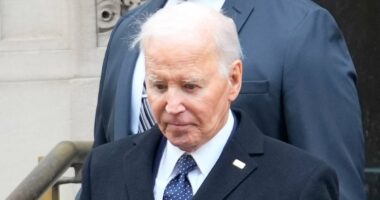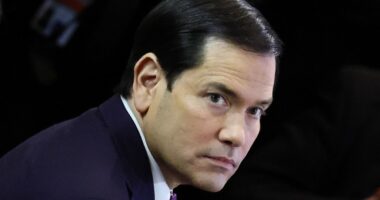Share this @internewscast.com
Long gone are the days when Black Friday meant wrestling over 65-inch plasma TVs or piling up on fragrant candles. The modern American consumer is approaching this shopping extravaganza with a changed mindset.
Once, the day following Thanksgiving served as a prime opportunity to snag jaw-dropping discounts on everything from kitchen gadgets to fashion ensembles. Nowadays, however, Black Friday presents a golden chance for Americans to secure essential household items at reduced prices.
As prices for everyday goods have soared, largely due to tariffs introduced during Donald Trump’s presidency and the persistent grip of inflation, consumers are placing a higher priority on stocking up on essentials rather than splurging on indulgent items.
This year, savvy shoppers are expected to zero in on hefty discounts for pet food, laundry detergent, and basic clothing items like socks and underwear, as reported by Bloomberg. These essentials are taking precedence over non-essential goods.
According to a survey conducted by consultancy firm Deloitte, a substantial 64 percent of shoppers indicated plans to focus on acquiring these basic necessities during the sales. This shift reflects a broader trend of prioritizing practical purchases over luxury splurges.
More than six in ten shoppers, 64 percent, said they intended to purchase the bare necessities during sales, according to consultancy Deloitte.
That’s up from last year, when just 58 percent of survey respondents responded in the same way.
The momentum has been building for months – even basic household staples, from dish soap to dishwasher rinse aid, ranked among the top sellers during Amazon’s Prime sale this summer.

Gone are the days of fighting over 65-inch plasma televisions or stockpiling scented candles (pictured: shoppers wait outside Bath & Body Works on Black Friday)

Americans are prioritizing bare necessities over luxury goods this Black Friday (pictured: Black Friday shoppers in San Francisco)

The day after Thanksgiving used to be an opportunity to take advantage of wild sales on everything from kitchen appliances to clothes (Pictured: Black Friday shoppers in Orlando in 2021)
‘As we saw during this summer’s back-to-school shopping season, consumers are keen to take advantage of holiday spending events to also purchase everyday goods,’ said Mark Mathews, chief economist and executive director of research at the National Retail Federation (NRF).
This is a reflection of growing anxiety over job security and general stress over the state of the economy.
The NRF says people will spend a little less on gifts, food, and other holiday items this year, and 85 percent of shoppers expect prices to rise because of tariffs.
Rising prices and growing concerns about recent layoffs have left Americans feeling the worst about their finances since 2009, according to University of Michigan data.
Government figures also show retail sales slowed in September, with drops at electronics and appliance stores, sporting-goods shops, and bookstores.
The gap between rich and middle- or lower-income households is widening.
In the second quarter, the top 10 percent of earners made up nearly half of all spending, according to Moody’s Analytics, while lower-income groups are becoming more careful with their money.
Joel Waldfogel, a professor at the University of Minnesota’s Carlson School of Management, explains that cutting back on gifts — or choosing practical items over luxury ones — can help people feel they’re being careful with their household budgets.

More than six in 10 shoppers, 64 percent, said they intended to purchase the bare necessities during sales (Pictured: Black Friday shoppers in New York last year)

Shoppers will take advantage of deep discounts on pet food, laundry detergent, socks, and underwear this Black Friday (stock image)
‘Getting socks or underwear under the tree is disappointing, but it’s a safe expenditure,’ Waldfogel said.
Nearly two-thirds plan to wait for this weekend’s big Thanksgiving discounts to do most of their shopping.
Megan Hamand, 37, a financial statement auditor in San Diego, normally waits until Black Friday to pick up her favorite $40 Bobbi Brown mascara and $28 Coola sunscreen.
She’s doing the same this year but will stock up on several of each to avoid paying full price down the road — a habit she first adopted last year as potential tariff hikes began to feel more real, according to Bloomberg.
‘It’s hard to not feel like things are less affordable,’ Hamand told the news outlet.
‘I don’t really have any incentive to buy anything at full price.’

















